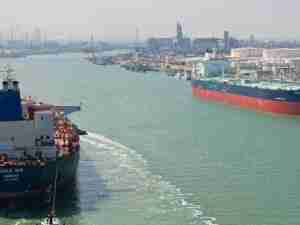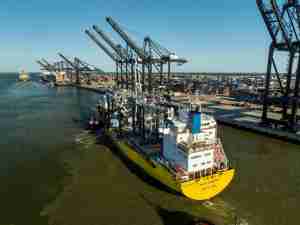A new report released by the World Trade Center of New Orleans, titled “Emerging South American Competitiveness to U.S. Soybean Exports”, reveals a growing threat to the United States’ position as a leader in the world soybean market.
The report on soybean exports is the result of a joint-study led by the University of Southern Mississippi and commissioned by the World Trade Center of New Orleans International Business Committee. According to the report, the U.S. stands to lose pace against soybean export competitors Brazil and Argentina. The report concludes that without investments and upgrades to inland waterway infrastructure within the Mississippi River system, Brazil will surpass the U.S. in soybean exports; the investments are also needed to give the U.S. an edge against its Argentine competitors, as the country seeks to lower its export taxes on soybeans.
“This new report highlights the critical need for investments in our inland waterway infrastructure so that U.S. goods stay competitive. As our competitors are rapidly growing in sophistication and capacity, we need to keep pace; we can do that by making infrastructure investments a top priority,” said Dominik Knoll CEO, World Trade Center of New Orleans.
The “Emerging South American Competitiveness to U.S. Soybean Exports” report was publicly released at a meeting of the WTCNO International Business Committee in December. Alongside remarks from Congressman and House Majority Whip Steve Scalise (R-LA), leaders from the University of Southern Mississippi, Big River Coalition and local ports spoke to the importance of the Mississippi River System and its infrastructure to global exports.
“This report is really highlighting not just the concepts that we have known for so long, but real numbers and metrics,” said Congressman Steve Scalise. “Look at what a difference five feet of dredging means to competitiveness; you can literally double the metric tons you can move on soybeans with that five extra feet of dredging.”
Dr. John Lambert with the University of Southern Mississippi stated, “The main concern for our grain farmers is to get the grain from the farms to the Mississippi River, and then from there to get it to other parts of the world. The footprint for deepening the Mississippi River impacts a network of rivers in 31 states which has massive implications to the U.S. agriculture industry. The Mississippi Basin produces 92% of the nation’s exports. The ports of Baton Rouge, South Louisiana, New Orleans, St. Bernard, and Plaquemines facilitate nearly 70% of the nation’s grain exports.”
According to the Report, Soybeans account for 35-30% of the grain and oilseeds exported from the center Gulf of Mexico region. In order to increase the capacity of the Lower Mississippi River once the Panama Canal expansion has been completed, the River will need to be drafted from its current depth of 45ft to 50ft. As it stands, the ports of the Lower Mississippi River are not deep enough to accommodate the Post or New Panama vessels which require a deeper draft.
During the meeting, Sean Duffy, Executive Director of the Big River Coalition, told International Business Committee members that he predicts the Mississippi River will be deepened to 50ft within the next 5 years. “The economic benefits will be huge. It is important to remember that we have ports on the east coast all in different phases of being deepened to prepare for the Post-Panamax environment. Deepening is the wave of the future. Not only do you have the Panama Canal deepening, but the Suez Canal has recently been evaluated for deepening as well. This Report will be a tool when we go to Congress to show what’s being done in other countries.”
The Report claims that the U.S. is failing to adequately fund the infrastructure of its waterways. In order to protect its $270 billion in exports, the U.S. would need to invest $30.2 billion through 2020. Currently, it is expected that funding will only reach $14.4 billion. Paul Aucoin, Executive Director of the Port of South Louisiana, said, “It’s important that larger vessels have access to the river. Just having the river drafted 50ft will increase the cargo by $16 billion annually for our ports. The amount in value of soybeans cargo will almost double. The larger vessels will be more heavily loaded which will result in cost savings. Many larger vessels call at our port, but are not yet fully loaded. It’s a big step in the right direction as far as keeping our competitiveness.”
Bobby Landry, Chief Commercial Officer, Port of New Orleans, also commented on the importance of deepening the Mississippi River. “To sum up the issue, everything is based on scale. If you don’t get bigger, you won’t be able to compete. We have to be able to bring the bigger ships in, in order to stay competitive. Bringing the larger ships in is good for the U.S. farmer, the U.S. petroleum industry, and all those in this room that depend on the port business. It’s a battle that we have to fight to win.”
WTC of New Orleans highlights need for Infrastructure Investments along Mississippi River
By: World Trade Center of New Orleans | Feb 09 2015 at 09:08 AM | Ports & Terminals









